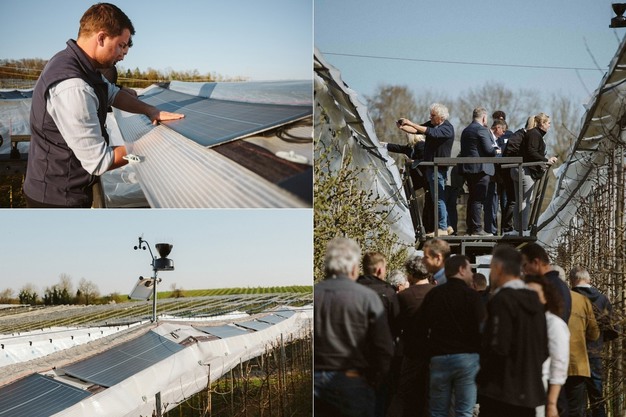Scientists at the Fraunhofer Institute for Solar Energy Systems ISE have joined forces with VOEN Vöhringer GmbH & Co. KG from Fronreute near Ravensburg to develop photovoltaic modules that are lightweight enough to be mounted on classic weather protection systems for special crops such as fruit trees. Furthermore, they are testing various solutions for attaching the lightweight modules to existing substructures and for new weather protection systems. Last week, the project team opened the first pilot plant above cherry trees on the Vöhringer fruit-growing farm.
Conventional agrivoltaics systems are installed on massive steel substructures that are built specifically for this purpose and have to be erected on empty agricultural areas or, at great expense, between trees or shrubs. An alternative concept is being tested by the weather protection provider VOEN and the Fraunhofer ISE on a cherry orchard in Upper Swabia. To achieve this, they are using the existing substructures for protective netting and plastic sheeting. Due to the limited load-bearing capacity, the project consortium developed a suitable lightweight module concept with a weight of less than 5 kilograms per square meter and an installed capacity of 420 kilowatts per hectare.
"The new concept addresses two factors that make agrivoltaics systems pricier than ground-mounted photovoltaics: the higher costs of constructing the mounting system and installing the PV modules," explains Felix Basler, project manager at Fraunhofer ISE. "In addition to developing the low-cost lightweight modules, we have designed and tested various solutions for their uncomplicated attachment to the classic weather protection systems used in special crop cultivation." The result can now be seen at Obstbau Vöhringer in Berg, near Ravensburg. The demonstration system set up there covers two rows of cherry trees with a length of approximately 40 meters.
 © Fraunhofer ISE / Foto: Lars MaurerThe official opening of the PV system at the Vöhringer fruit-growing farm took place on April 4.
© Fraunhofer ISE / Foto: Lars MaurerThe official opening of the PV system at the Vöhringer fruit-growing farm took place on April 4.
Established protective function remains intact
"The installation is extremely easy as a new or upgrade solution," says Leo Vöhringer, project manager at VOEN. "It was important to us to tailor an agrivoltaics concept to fruit-growing practice and not the other way around. The established crop protection against weather and other harmful influences remains in place with our concept." At times of the year when the weather protection is not needed, it can be packed and stowed under the solar modules. The project team monitors the electricity yield of the system and the harvest yield of the cherry trees throughout the year and will evaluate the data at the end of 2025.
Agrivoltaics enables the efficient dual use of agricultural land. Particularly in fruit growing, strong synergies are emerging: the plants benefit from partial shading and protection against extreme weather while the PV modules are cooled by the microclimate below them, enabling them to produce more electricity on hot days. As part of the project, the research team used specially developed software to simulate the optimal module size that would still ensure that the yield of the cherry trees would not be affected by shading. In the south of Baden-Württemberg alone, more than 5,000 hectares of fruit trees are covered by nets or plastic sheeting. The potential of these areas could be better utilized through agrivoltaics concepts.
Statewide cooperation
The research project "VOEN e-crops - Flexible solar modules for weather protection systems in special crop cultivation" is funded by the Baden-Württemberg Ministry of Economic Affairs, Labour, and Tourism through the Invest BW program.
For more information:
Leo Vöhringer
VOEN Vöhringer GmbH & Co. KG
Eyber Straße 9
88273 Fronreute
T: +49(0)7502 97795-0
info@voen.de
www.voen.de
www.ise.fraunhofer.de
